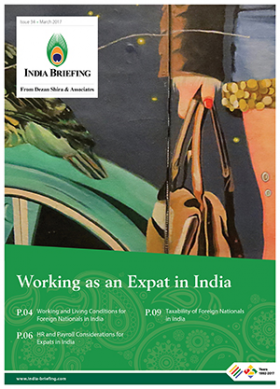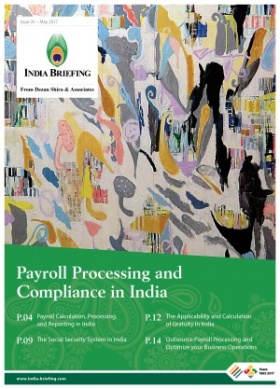Registering Your Indian Employment Visa

Up until recently, expatriates first in-country encounter with Indian bureaucracy occurred at the Foreign Regional Registration Office (FRRO). However, from February 2018 onwards, this administration process has been digitized.
As of February 12, foreigners who need to register their visa, request a new visa, or extend their visa will be able to do so on the online FRRO portal. The portal offers online solutions for submitting applications and documents.
While the new online facility is a great step forward for many expatriates who commonly lament their FRRO experiences, employers and foreign professionals should still consider employing advisors to manage or review visa applications and registrations: the cumulative cost of registration delays or an investigation is not worth the risk.
India’s FRRO regulation
After obtaining an Indian employment visa, registering the visa at an FRRO is often an afterthought for expatriates. However, visa holders should plan to register their visa as soon as possible.
Failing to register a visa within the specified time period can result in a fine, and in some cases, an investigation. An investigation can take several weeks – the visa holder is not permitted to leave the country during this time period. In addition, investigations may complicate any future visa applications or renewals.
If the duration of the visa exceeds six months (180 days), the visa holder must register the visa, within 14 days of arrival, with the FRRO. An exception to this is for Pakistani nationals, who must register within 24 hours.
Required documentation
Like the visa application, both the visa holder and their employer must provide the supporting documents. This process requires coordination between the visa holder and their employers; visa holders and their employers should plan to allow 2-3 days to gather and complete these documents.
The visa holder must ordinarily provide:
- A completed visa registration application form;
- Six passport size photos of the applicant;
- A copy of the photo page within the passport;
- A copy of the visa page within the passport;
- Proof of address, such as a driver’s license or utility bill, from the visa holder’s home country;
- A notarized copy of a lease deed/agreement or a C-Form from a hotel of residence; and,
- Visa registration fees.
The employer must ordinarily provide:
- Two copies of a permission letter that requests approval for the applicant’s visa registration;
- Two copies of a sponsorship letter that pledges responsibility for the applicant’s activity in India and promises to repatriate the applicant at company cost if any adverse conduct comes to notice;
- Two copies of a letter confirming the visa holder’s residential address in India;
- Two copies of an employment contract that specifically states the monthly salary, designation, tenure of employment, etc.; and,
- The company’s Incorporation Certificate.
We note that while authorities do not require two copies of the employer’s information, it is advisable for employers to provide duplicates for their employee so that they can retain a copy of each document for personal records.
All applicants should maintain all documents – with an exception for the Incorporation Certificate – in original copy, drafted on company letterhead, signed by a senior manager, and marked with the company’s official stamp.
Registering through the online portal
Employers and visa holders should review registration requirements together to ensure that all supporting documents are available and correct. The following is required:
- A foreign national using the online FRRO portal must first create a user ID and password;
- The application form must be filled online;
- The application form requires a passport size photograph in .jpg format with the maximum file size of 1 MB;
- The application form requires documents to be uploaded in a single PDF format not exceeding 1 MB; and,
- The fee must be paid online.
The applicant can track the status of the application through the FRRO portal; services granted or rejected will be informed through email or SMS alert. The document applied for will then be sent by postal delivery to the address provided by the foreign national or to the registered email address. It can also be downloaded from the portal.
The portal does not specify any standard timelines for processing applications. Applicants must apply in advance to avoid delays, and should upload all prescribed documents.
Registering at an FRRO
In case the foreign national chooses to visit the FRRO to register an employment visa, the visa holder needs to prepare specific documents required by Indian authorities.
The latest available listing shows that FRROs are located in the following cities across India:
Visa holders may schedule a visa registration appointment; however, many visa holders simply visit the FRRO at a time of their choosing. Visa holders who have not scheduled a registration appointment should arrive at the FRRO as early as possible to avoid large crowds.
Visa holders will likely need to wait several hours for a registration officer, but a registration certificate from the officer will be issued in a matter of minutes. Once the process is completed, the visa holder becomes legally eligible to work and reside in India for the allowed period.
Foreigners must note that visa consultants or any other guest cannot enter the FRRO with the visa holder.
A cumbersome but valuable experience
Registering an employment visa can be a burden for freshly arrived expatriates.
Although visa holders seeking to register their stay in India can successfully do so independently, many companies employ a local visa consultant. These consultants, who are often certified lawyers, can provide form letters and crosscheck registration documents to ensure that registration applications do not invite any undue scrutiny.
The experience can, however, provide important insights into the Indian bureaucratic process. Expatriates unfamiliar with Indian bureaucracy will learn local practices that are critical for preparing and submitting official documents in India – both online and offline.
Moreover, the process can help managers understand the amount of time and energy required for doing business with local government offices.
Editor’s Note: The article was first published in December 2014, and has been updated on February 27, 2018 as per the latest regulatory developments.
About Us
India Briefing is published by Asia Briefing, a subsidiary of Dezan Shira & Associates. We produce material for foreign investors throughout Eurasia, including ASEAN, China, Indonesia, Russia, the Silk Road, & Vietnam. For editorial matters please contact us here and for a complimentary subscription to our products, please click here.
Dezan Shira & Associates provide business intelligence, due diligence, legal, tax and advisory services throughout India and the Asian region. We maintain offices in Delhi and Mumbai and throughout China, South-East Asia, India, and Russia. For assistance with India investment issues or into Asia overall, please contact us at india@dezshira.com or visit us at www.dezshira.com.
- Previous Article Germany, India Diversify Economic Relations – Manufacturing, SMEs, Startups
- Next Article Minimum Alternate Tax in India: Foreign Infrastructure Companies Exempt














